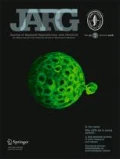Abstract
Transient rises in plasma prolactin levels can be observed during the late follicular phases of both natural and stimulated cycles. It has been suggested that such a phenomenon might adversely affect the success of in vitro fertilization. This prospective study was designed to assess the effect of transient rises in prolactin levels on the endocrine response to ovarian stimulation and the outcome of in vitro fertilization treatment. A total of 90 treatment cycles in 87 couples was studied. Prolactin was measured in the mid and late follicular phases of the cycles. During the study period, 24 pregnancies occurred. There were no differences in those cycles in which pregnancy did or did not occur in either mid or late follicular prolactin levels. Neither the initial level nor the percentage rise in prolactin during the stimulation had any effect on the peak estradiol level achieved, the numbers of follicles seen, the number of eggs retrieved, or the incidence or outcome of pregnancy. It was concluded that transient hyperprolactinemia is of no significance in ovarian stimulation for in vitro fertilization.
Similar content being viewed by others
References
Ben-David M, Schenker JG: Transient hyperprolactinemia: A correctable cause of idiopathic female infertility. J Clin Endocrinol Metab 1983;57:442–444
Ho Yuen BH, McComb P, Sy L, Lewis J, Cannon W: Plasma prolactin, human chorionic gonadotrophin, estradiol, testosterone and progesterone in the ovarian hyperstimulation syndrome. Am J Obstet Gynecol 1979;133:316–320
Healy DL, Burger GH: Serum-follicle-stimulating-hormone and prolactin during the induction of ovulation with exogenous gonadotrophin. J Clin Endocrin Metab 1983;56:474–478
Reinthaller A, Bieglmeier C, Deutinger J, Csaicsich P, Transient hyperprolactinemia during cycle stimulation: Influence on the endocrine response and fertilization rate of human oocytes and effects of Bromocryptine treatment. Fertil Steril 1988;49:432–436
Dorrington J, Gore-Langton RE: Prolactin inhibits oestrogen secretion in the ovary. Nature 1981;290:600–602
DeVane GW, Guzick DS: Bromocryptine therapy in normoprolactinemic women with unexplained infertility and galactorrhea. Fertil Steril 1986;46:1026–1031
Gonen Y, Casper RF: Does transient hyperprolactinemia during ovarian stimulation interefere with conception or pregnancy outcome? Fertil Steril 1989;51:1007–1010
Taylor PJ, Mahadevan M, Leader A, Wiseman D, Servis S: Initial experience with in vitro fertilization and embryo transfer at the University of Calgary/Foothills Hospital. J Vitro Fert Embryo Transfer 1985;2:112–113
Taylor PJ, Trounson A, Besanko M, Burger HG, Stockdale J: Plasma progesterone and prolactin changes in superovulated women before, during and immediately after laparoscopy for in vitro fertilization and their relation to pregnancy. Fertil Steril 1986;45:680–686
Denef C, Andries M: Evidence for paracrine interaction between gonadotrophs and lactotrophs in pituitary cell aggregates. Endocrinology 1983;112:813–822
Author information
Authors and Affiliations
Rights and permissions
About this article
Cite this article
Anthony Pattinson, H., Taylor, P.J., Fleetham, J.A. et al. Transient hyperprolactinemia has no effect on endocrine response and outcome in in vitro fertilization (IVF). J Assist Reprod Genet 7, 89–93 (1990). https://doi.org/10.1007/BF01135580
Received:
Accepted:
Issue Date:
DOI: https://doi.org/10.1007/BF01135580




